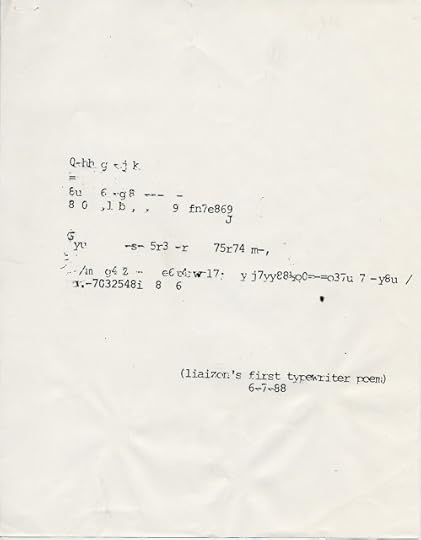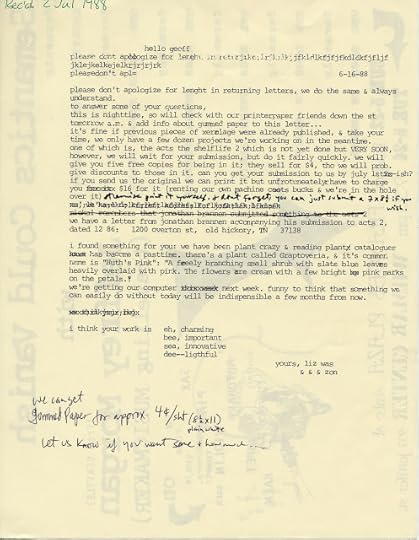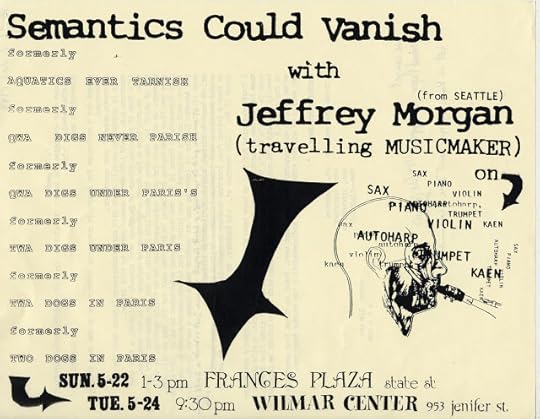When There Was Mail

At one point in time, it was the 1980s, I was still a young man in his twenties, between children (well, between the births of my two children), and I lived my life through the mails. Being a visual poet at that time meant that I was living distant from the company of other visual poets, there being only a few places on the continent where two visual poets might run into each other: Seattle, Toronto, and that may be the entire list, now that I think it through.
So the mails were important because that was our network, that was how we remained in contact: we sent paper and objects to each other. It was a kind of gift economy, sometimes almost a potlatch, though sometimes we also sold the objects of our attention: little books of visual poetry, zines, broadsides. The mail was our anti-isolation (which was the title of a short-lived zine run by the married couple Miekal And and Liz Was*). That was how we kept from being nothing more than individuals separate from everything else.
And we waited for the mail each day, or waited to return home from work each day, because it was in finding and reading our mail that we became what we were: networked artists, who developed separately but always within that fibrous web of our peers.
So it is that one day at the beginning of July (my handwriting at the top of the letter tells me it was the second of July) in 1988 that I received a letter from Liz Was, the one I recall the best. Along with this letter came a copy of Miekal and Liz's son Liaizon Wakest's first typewriter poem. (I have an equivalent creation by my daughter Erin somewhere.) Although the poem is simply gibberish that a very young Zon tapped out on a typewriter (apparently a manual one), it has a little of the feeling of a da levy poem to it, and it resembles something like the transcript of a bit of typewriter correction ribbon. Still, I enjoy how it seems to make sense here and there, maybe even saying that multiplicitous you ("y8u") weighs 80 lbs. I was a bit touched that Liz sent me this little treasure, which now rests within my papers at the University at Albany.

But even more important was the letter from Liz, who (being a woman) was always the more talkative letter writer of the pair that was And and Was. And the letter was important because it was what anti-isolation was about for us.
Starting off just a tad more comprehensible than Zon's first typewriter poem, Liz's note contains more interesting and important information than I could have imagined at the time:
1. It discussed the issue of their magazine Xerolage that would become one of my first books and still a favorite of mine, The Dreams of the Fishwife. (Interestingly, this was a book of xerographically distorted typewriter poems.)
2. It discussed my contribution to the second (and, so far, latest) issue of The Acts, The Shelflife, which was an assembling magazine with essays about networking, including Crag Hill's visual essay, "Is the Net Working?"
3. It gave me the address (no longer current) of Jonathan Brannen, who was a visual poet who lived in Nashville, Tennessee, when I lived there, and whose work I'd seen in an exhibition at the main library at Vanderbilt once. The eldest of my three sisters actually worked with Jonathan, so I had many connections with him, though no real connections at all, so I was interested in a little more anti-isolation in his case.
4. It introduced me to the plant named Huth's Pink, which was a surprising use of my surname. I've always meant to track down one of these plants for my own, but I've yet to do this. I suppose, it's been under a quarter of a century, so I might still have time.
5. It mentioned Liz and Miekal's upcoming purchase of a computer, which significantly changed the output of their press and the art they created, and which let to Miekal's little-noted career as a web designer.
and
6. It ended with an unexpected kind assessment of my visual poetry by Liz.
This was anti-isolation.

Included in the package I received was a flyer fro a musical performance that included Twa Dogs in Paris (Miekal and Liz again) even though it had happened a couple of weeks before the writing of the letter. That was not a problem. I received the flyer not so I could attend the event, but so I could know it had happened, and so I could see all the other forms that the name Twa Dogs in Paris took.
Because we are never again in the future the people we are in the present. And Miekal and Liz were always proving that.
_____
* Here both of these people were using the second forms of their names, which eventually became mIEKAL aND and Lyx Ish.
ecr. l'inf.
Published on March 15, 2012 20:56
No comments have been added yet.



